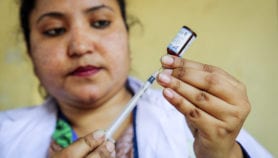Send to a friend
The details you provide on this page will not be used to send unsolicited email, and will not be sold to a 3rd party. See privacy policy.
[SYDNEY] Developing countries can learn from the experiences of Brazil and Thailand when it comes to sustaining access to anti-HIV drugs, says Médecins Sans Frontières.
The international medical charity has published a report in the July 2007 issue of the journal AIDS, in which the authors state that the Thai and Brazilian experience sends a clear message that "generic manufacture is worthwhile", but that governments need support from an informed civil society when putting health before trade.
The report was released this week (23 July) at an international conference on HIV in Sydney.
Brazil and Thailand are among the few developing countries to provide universal access to HIV medicines to their infected population. But because they are both classed as middle-income countries, they are unable to access the lower prices offered to least developed countries, and antiretrovirals remain unaffordable.
The authors report that Brazil and Thailand were unable to secure acceptable prices by negotiating with drug firms. By relying on negotiations, Brazil still paid up to four times more for some drugs compared with prices available elsewhere, while Thailand failed to negotiate the price of the drugs down to what it considered affordable.
Earlier this year, both countries issued compulsory licences for antiretroviral drugs, breaking their patents (see Drug licences all for the poor, says Thai minister and Brazil breaks patent on HIV/AIDS drug).
Thailand’s decision to issue compulsory licensing for two anti-HIV drugs — lopinavir and ritonavir — resulted in pressure from the industry and United States government, and the refusal of Abbott, the manufacturer of the drugs, to sell another, new anti-HIV drug (Aluvia) to Thailand.
But Thailand’s actions had positive repercussions for other developing countries, says the report. It motivated Brazil to follow suit, and forced Abbott to lower the price in over 40 countries.
The report says India, another developing country with a strong domestic drug industry but a weak national AIDS control programme, faces similar challenges. At the moment, it is unclear whether India will exercise the right to issue compulsory licenses, and how effective they will be.
Michel Sidibe, deputy executive director of programmes at UNAIDS, the joint United Nations programme on HIV/AIDS, told SciDev.Net that it was important for the governments and the pharmaceutical companies to find a way to finance research and development to make these drugs accessible and affordable. Access to HIV treatment is still scarce in the developing world, he pointed out.
"We have to be very realistic because we are reaching a level of maturation of the HIV/AIDS epidemic worldwide," Sidibe says.
Reference: AIDS 21, S21 (2007)













